have_has-do-does的用法与练习题
have和has在句子中的正确运用技巧

have和has在句子中的正确运用技巧Have和has是英语中表示“有”的动词,它们在句子中的使用和运用有一些特定的技巧。
以下是关于have和has的正确运用技巧的一些重要指导原则。
一、基本用法:1. Have通常用于第一人称(I, we)和第二人称(you)以及第三人称复数(they, we)中;2. Has通常用于第三人称单数(he, she, it)中。
例句:- I have a pen.(我有一支笔。
)- She has a cat.(她有一只猫。
)二、肯定句的构成:1. 主语 + have/has + 名词(单数或复数形式)例句:- They have two children.(他们有两个孩子。
)- He has a car.(他有一辆车。
)三、否定句的构成:1. 主语 + do not/does not + have2. 主语 + haven't/hasn't got(口语表达)例句:- She does not have a brother.(她没有兄弟。
)- I haven't got any money.(我没有任何钱。
)四、疑问句的构成:1. Do/Does + 主语 + have?例句:- Do you have a pencil?(你有一支铅笔吗?)- Does he have a job?(他有工作吗?)五、注意特殊情况:1. 主语为第三人称单数时,须用has,不能用have。
2. 有些名词没有复数形式, 如furniture,information等,即使是指多个事物,仍然使用单数形式。
例句:- The furniture has been delivered.(家具已经送到了。
)- The information is correct.(这个信息是正确的。
)六、特殊情况下的使用:1. 表示情感、感觉或状态时,通常使用have。
2. 表示某个动作的经验或经历时,通常使用have。
have,has的用法

have,has的用法have和has是英语中常见的动词,它们表示"拥有"或者"持有"的意思。
这两个词根据主语的人称和数的不同形式有所变化:have用于第一、第二以及第三人称复数主语(I, you, we, they),以及第二人称单数主语(you),而has则用于第三人称单数主语(he, she, it)。
一、have和has的肯定句用法1. 拥有物体:have/has + 名词例如:- I have a car.(我有一辆车。
)- She has a cat. (她有一只猫。
)- They have two dogs. (他们有两只狗。
)2. 拥有特征、感觉或状态:have/has + 形容词例如:- We have a big house. (我们有一所大房子。
)- He has a lovely smile. (他有一个可爱的笑容。
)- She has a sore throat. (她喉咙痛。
)3. 持有某种位置: have/has + 介词短语例如:- They have a picnic in the park. (他们在公园里野餐。
)- He has a meeting at 2 p.m. (他下午两点有个会议。
)二、have和has的否定句用法1. 在肯定句中加入否定词not构成否定句例如:- I do not have a car. (我没有汽车。
)- She does not have a cat. (她没有猫。
)- They do not have two dogs. (他们没有两只狗。
)2. 在肯定句的缩略形式中,常用haven't 和 hasn't例如:- I haven't seen him today. (我今天还没见到他。
)- She hasn't finished her homework. (她还没有做完作业。
have has的用法

have和has的用法有哪些1、谓语动词have表示“有”,有两种形式:have和has,前者用于第一人称(I,we),第二人称(you)和第三人称复数(they),后者用于第三人称单数(he,she,it)或单数名词。
如:I have an apple and he has two bananas.我有一个苹果,他有两个香蕉。
2、have/has句型与there be句型的比较:两者都表示“有”,但用法不同。
前者表示所属关系,即表示“某人或某物有什么”,而后者表示存在,表示“某地有什么”。
如:They have some new books.他们有一些新书。
3、have/ has的否定句,一般要加助动词do/does,再加not构成,即do not have (don’t have)/does not have (doesn’t have)如:We don’t have any classes on Saturday.我们星期六没有课。
4、一般疑问句由“助动词Do/ Does + 主语+ have + 宾语”构成,回答用Yes, … do/ does.或者No, … don’t/ doesn’t.如:--Do you have a big house?他们的房子大吗?5、特殊疑问句由特殊疑问词+助动词do/does+have(+状语)构成。
如:What do they have?他们有什么?2have和has的区别have一般在主语是I,you或主语是复数的时候用,而has在主语是he,she 的时候用,但have都表示“有”。
have用于主语是非第三人称单数,如:we/they/you/I等。
如:I have a pen.当主语是第三人称单数时用has,如she/he/it如:My mother has been to the Great Wall three times.have前面一般是第一、二人称或者是复数,例如:We,I,You,Mary and John,Parents,Books;has则是相反的,一般是第三人称或者单数,例如:A monkey,The girl...这是最基础的不同点。
have has,do does 的用法

一、用词的适当形式填空。
1.Nancy _____(have)two big eyes.2._____ (do) your brother have an animal friend?肯定回答:___________________否定回答:____________________3.They ______(have) no legs or arms.4._____(do) Helen have a dog?5.My cats ______(have) long tails.6.His cousin _____(have) some toy cars.7.LiuTao and Mike _____(have) two animal friends.8._____(do) you have _____ (some) toy cars?9.It ____ four legs and a short tail.10._____(do) Lily _____(have) any milk ?11.Yang Ling doesn’t ______ (have) any books.12.______ (do) Liu tao and Mike like Maths?肯定回答:___________________否定回答:____________________13.Goldilocks ______(have) a nice dress.14.He _____ (have) a lot of pencils.15._______ (do) you have an English lesson on Monday morning?二.选词填空。
1. There are five (fish,fishes) in the water.2. Helen (have, has) a watch.3. Can you (dance, dancing)?4. It (have, has) long hair and big (eye, eyes).5. --What (does, do) she (have, has)? --She (have, has) a cat.6. Jack and Tom (don’t have, doesn’t has) a toy car.7. I can’t find ______________(his, him).8. The girl can dance, but the boy ___________ (can, can’t).9. There __________ (aren’t, are) any apples in the basket.10. —_____________(Where’s, What’s) on the bed? —There’s a doll on it.。
have_has_do_does的用法与练习题知识分享

h a v e_h a s_d o_d o e s的用法与练习题have/has专项训练姓名________________①作“有”讲时,强调“所属关系”,表示“拥有”的意思。
其主语常为人或物。
如:My father has many new books.我爸爸有许多新书。
I have a new computer.我有一台新电脑。
②“have+表示一日三餐的名词”,意为“用餐”。
如:have breakfast/lunch/supper吃早饭/午饭/晚饭。
③“have+表示食品、饮料等名词”,意为“吃;喝”。
如:have bread吃面包 have eggs 吃鸡蛋 have tea 喝(一杯)茶。
④“have+表示动作的名词”,没有固定的意思,常与表示动作的名词同义。
如:have a rest 休息一下have a swim 游泳 have a drink (of...)喝一点(……)have a look (at ...)(朝……)看一眼⑤“have+表示某种活动的名词”,意为“进行,举行”。
如:如:have a class (学生) 上课have a birthday party 举行生日聚会一.填写正确的形式。
1.I ____ (have) a cat.2.He ____ (have) a dog.3.She ____ (have) long hair.4.We ____ (have) a big house.5.They ____ (have) a happy family.6.It ____ (have) a short neck.7.You ____ (have) a good teacher.8.Elva ____ (have) two big eyes.9.Tom ____ (have) a red pen.10.My mother ____ (have) a small nose. 11.Cats ____ (have) four legs.12.Dogs ____ (have) two ears.13.My father ____ (have) a blue car.14.Everybody ____ (have) two hands.15.I ____ (have) a cat.16.Lily ____ (have) a toy.17.Students ____ (have) many books.18.Girls ____ (have) nine books.19.The baby ____ (have) two teeth.20.They ____ (have) some apples.二.Fill in the blank with “ have, has ”1. I_________ a nice puppet.2. He_________a good friend.3. They__________ some masks.4. We___________some flowers.5. She___________ a duck.6. My father____________ a new bike.7. Her mother___________a vase.8. Our teacher_________ an English book.9. Our teachers___________a basketball.10. Their parents___________someblankets 11. Nancy_________many skirts.12. David__________some jackets.13. My friends__________a football.14. What do you__________?15. What does Mike__________?16. What do your friends___________?17. What does Helen___________?18. His brother________a basketball.19. Her sister_________a nice doll.20. Miss Li__________an English book.三.下面我们做一些练习来巩固一下:do/does专项训练姓名________________ 分数________________①作为行为动词,表示“做”如:I always do housework. 我经常做家务。
have-has-do-does的用法与练习题

have/has专项训练 ________________①作“有”讲时,强调“所属关系”,表示“拥有”的意思。
其主语常为人或物。
如:My father has many new books.我爸爸有许多新书。
I have a new computer.我有一台新电脑。
②“have+表示一日三餐的名词”,意为“用餐”。
如:have breakfast/lunch/supper吃早饭/午饭/晚饭。
③“have+表示食品、饮料等名词”,意为“吃;喝”。
如:have bread吃面包 have eggs 吃鸡蛋 have tea 喝(一杯)茶。
④“have+表示动作的名词”,没有固定的意思,常与表示动作的名词同义。
如:have a rest 休息一下 have a swim 游泳 have a drink (of...)喝一点(……) have a look (at ...)(朝……)看一眼⑤“have+表示某种活动的名词”,意为“进行,举行”。
如:如:have a class (学生) 上课have a birthday party 举行生日聚会一.填写正确的形式。
1.I ____ (have) a cat.2.He ____ (have) a dog.3.She ____ (have) long hair.4.We ____ (have) a big house.5.They ____ (have) a happy family.6.It ____ (have) a short neck.7.You ____ (have) a good teacher.8.Elva ____ (have) two big eyes.9.Tom ____ (have) a red pen.10.My mother ____ (have) a small nose. 11.Cats ____ (have) four legs.12.Dogs ____ (have) two ears.13.My father ____ (have) a blue car.14.Everybody ____ (have) two hands.15.I ____ (have) a cat.16.Lily ____ (have) a toy.17.Students ____ (have) many books.18.Girls ____ (have) nine books.19.The baby ____ (have) two teeth.20.They ____ (have) some apples.二.Fill in the blank with “ have, has ”1. I_________ a nice puppet.2. He_________a good friend.3. They__________ some masks.4. We___________some flowers.5. She___________ a duck.6. My father____________ a new bike.7. Her mother___________a vase.8. Our teacher_________ an English book.9. Our teachers___________a basketball.10. Their parents___________some blankets 11. Nancy_________many skirts.12. David__________some jackets.13. My friends__________a football.14. What do you__________?15. What does Mike__________?16. What do your friends___________?17. What does Helen___________?18. His brother________a basketball.19. Her sister_________a nice doll.20. Miss Li__________an English book.三.下面我们做一些练习来巩固一下:①根据汉语提示完成句子,使句意完整。
does和have的用法区别

does和have的用法区别一、Does和Have的用法区别在英语中,动词是构成句子的核心成分之一。
对于刚开始学习英语的人来说,经常会遇到does和have这两个动词,并感到困惑它们之间的区别。
本文将详细解释does和have的用法区别。
1. Does 的用法首先,让我们来看看does在句子中的用法。
(1) 助动词:does常常作为助动词,用于构成疑问句和否定句。
例如:- Do you like ice cream?(你喜欢冰淇淋吗?)- He doesn't enjoy playing football.(他不喜欢踢足球。
)需要注意的是,当主语是第三人称单数时,使用does作为助动词。
(2) 表示第三人称单数:当主语为第三人称单数时,我们使用does来表示现在时态的肯定句。
例如:- She does her homework every day.(她每天都做作业。
)(3) 强调句:有时候我们可以使用does来强调某些特定信息。
例如:- Linda does speak Spanish well.(琳达确实很擅长说西班牙语。
)这里,“does”起到了强调Linda确实会说西班牙语的作用。
二、Have的用法接下来,我们来看看have在句子中的用法。
(1) 助动词:have常常作为助动词,用于构成疑问句和否定句。
例如:- Have you seen that movie?(你看过那部电影吗?)- They haven't finished their project yet.(他们还没有完成他们的项目。
)(2) 表示所有权、拥有或经验:当我们要表达拥有某物、经历过某事或具备某种特征时,我们使用have。
例如:- I have a dog.(我有一只狗。
)- She has two brothers.(她有两个兄弟。
)- He has been to Japan twice.(他已经去过日本两次了。
have has 的用法,我是这样教 的
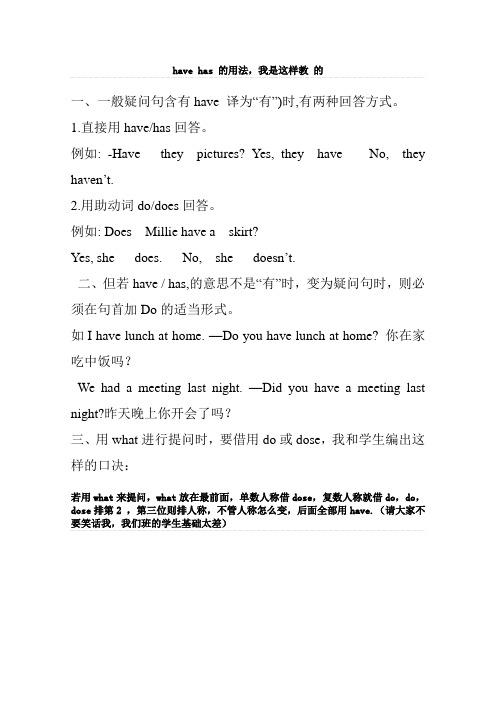
have has 的用法,我是这样教的
一、一般疑问句含有have 译为“有”)时,有两种回答方式。
1.直接用have/has回答。
例如: -Have they pictures? Yes, they have No, they haven’t.
2.用助动词do/does回答。
例如: Does Millie have a skirt?
Yes, she does. No, she doesn’t.
二、但若have / has,的意思不是“有”时,变为疑问句时,则必须在句首加Do的适当形式。
如I have lunch at home. —Do you have lunch at home? 你在家吃中饭吗?
We had a meeting last night. —Did you have a meeting last night?昨天晚上你开会了吗?
三、用what进行提问时,要借用do或dose,我和学生编出这样的口决:
若用what来提问,what放在最前面,单数人称借dose,复数人称就借do,do,dose排第2 ,第三位则排人称,不管人称怎么变,后面全部用have.(请大家不要笑话我,我们班的学生基础太差)。
have_has-do-does的用法与练习题

have/has 专项训练 姓名________________ 分数________________have/has 的用法①作“有”讲时,强调“所属关系”,表示“拥有”的意思。
其主语常为人或物。
如:My father has many new books .我爸爸有许多新书。
I have a new computer .我有一台新电脑。
②“have +表示一日三餐的名词”,意为“用餐”。
如:have breakfast /lunch /supper 吃早饭/午饭/晚饭。
③“have +表示食品、饮料等名词”,意为“吃;喝”。
如:have bread 吃面包 have eggs 吃鸡蛋 have tea 喝(一杯)茶。
④“have +表示动作的名词”,没有固定的意思,常与表示动作的名词同义。
如: have a rest 休息一下 have a swim 游泳 have a drink (of ...)喝一点(……) have a look (at ...)(朝……)看一眼⑤“have +表示某种活动的名词”,意为“进行,举行”。
如:如: have a class (学生) 上课 have a birthday party 举行生日聚会 一.填写正确的形式。
1.I ____ (have) a cat. 2.He ____ (have) a dog. 3.She ____ (have) long hair. 4.We ____ (have) a big house. 5.They ____ (have) a happy family. 6.It ____ (have) a short tail. 7.You ____ (have) a good teacher. 8.Elva ____ (have) two big eyes. 9.Tom ____ (have) a red pen.10.My mother ____ (have) a beautiful nose. 11.Cats ____ (have) four legs. 12.Dogs ____ (have) two ears. 13.My father ____ (have) a blue car. 14.Everybody ____ (have) two hands. 15.I ____ (have) a model plane. 16.Lily ____ (have) a doll.17.Students ____ (have) many books. 18.Girls ____ (have) many skirts. 19.The baby ____ (have) no teeth. 20.They ____ (have) some fish. 二.Fill in the blank with “ have, has ” 1. I_________ a nice puppet. 2. He_________a good friend. 3. They__________ some masks. 4. We___________some flowers. 5. She___________ a duck.6. My father____________ a new bike.7. Her mother___________a vase.8. Our teacher_________ an English book.9. Our teachers___________a basketball. 10. Their parents___________some blankets 11. Nancy_________many skirts. 12. David__________some jackets. 13. My friends__________a football. 14. What do you__________? 15. What does Mike__________? 16. What do your friends___________? 17. What does Helen___________? 18. His brother________a basketball. 19. Her sister_________a nice doll. 20. Miss Li__________an English book. 三.下面我们做一些练习来巩固一下: ①根据汉语提示完成句子,使句意完整。
havehas的练习及回答
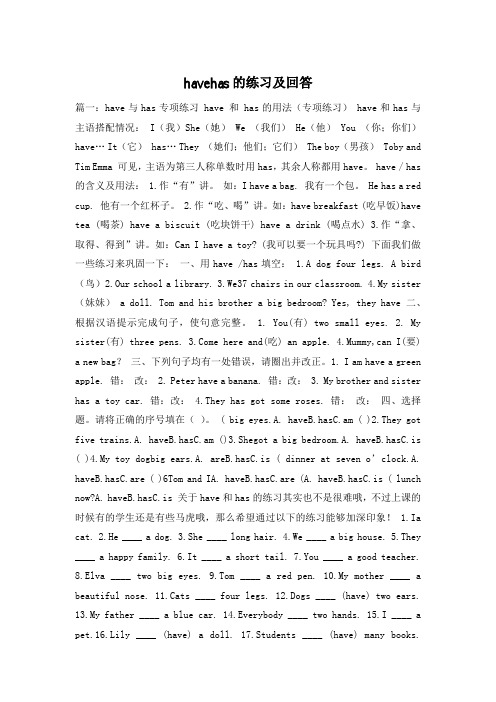
havehas的练习及回答篇一:have与has专项练习 have 和 has的用法(专项练习) have和has与主语搭配情况: I(我)She(她) We (我们) He(他) You (你;你们)have… It(它)has… They (她们;他们;它们) The boy(男孩) Toby and Tim Emma 可见,主语为第三人称单数时用has,其余人称都用have。
have / has 的含义及用法: 1.作“有”讲。
如:I have a bag. 我有一个包。
He has a red cup. 他有一个红杯子。
2.作“吃、喝”讲。
如:have breakfast (吃早饭)have tea (喝茶) have a biscuit (吃块饼干) have a drink (喝点水) 3.作“拿、取得、得到”讲。
如:Can I have a toy? (我可以要一个玩具吗?) 下面我们做一些练习来巩固一下:一、用have /has填空: 1.A dog four legs. A bird (鸟)2.Our school a library. 3.We37 chairs in our classroom. 4.My sister (妹妹) a doll. Tom and his brother a big bedroom? Yes, they have 二、根据汉语提示完成句子,使句意完整。
1. You(有) two small eyes. 2. My sister(有) three pens. e here and(吃) an apple. 4.Mummy,can I(要) a new bag?三、下列句子均有一处错误,请圈出并改正。
1. I am have a green apple. 错:改: 2. Peter have a banana. 错:改: 3. My brother and sister has a toy car. 错:改: 4.They has got some roses. 错:改:四、选择题。
译林苏教版五上专项特训七

专项特训(7)have/has,do/does的用法及练习have/has一、have/has的肯定陈述句基木结构为“主语+have/has+某物.”。
当主语为第三人称单数时用has,其人你作主语时用have.如。
Liu Tao has a little sister.刘诗有一个小妹妹。
You have a tent and they have some pots.你有一个帐篷,他们有一些锅。
二、have/has的否定陈述句基本结构为“主语+don't/doesn't have十某物,”。
当主语为第三人称单数时用doesn't have,其众人称作主语时用don't have。
此句型的同义句型为“主语+have/has no.….”。
如:I don't have an animal friend,=I have no animal friend.我设有动物朋友。
三、含have的一般疑问句1.问句:Do+主语(第一、二人称及第三人称复数)+have+某物?回答:Yes,主语+do./No,主语+don't.如:-Do you have a ruler?你有-把尺子吗?—Yes,I do.是的,我有。
2.问句:Does+主语(第三人称单数)+have+某物?回答:Yes,主语+does./No,主语+doesn't.如:-Does Mike have a dictionary?迈克有一本字典吗?-No,he doesn't.不,他没有。
三、含have的特殊疑问句问句:What+do/does+主语+have?回答:主语+have/has+...如:-What do you have?你有什么?—I have a nice doll.我有一个漂亮的洋娃娃。
四、have/has和there be的区别两者都表示“有”。
have/has强调所属关系,通常放在主语之后,即“主语+have/has+某物”;there be强调“存在”,放在句首,即“There be+某人/某物+某地”。
(完整版)5A_have_has和do__does专项练习

(完整版)5A_have_has和do__does专项练习have, has 和do, does 专项练习班级_________ 姓名_________一、have 和 has 用法(1)作“有"讲时,强调“所属关系”,表示“拥有”的意思。
其主语常为人或物。
如: My father has many new books.我爸爸有许多新书。
I have a new computer.我有一台新电脑。
(2) have+表示一日三餐的名词,意为“用餐”。
如:have breakfast/have lunch/have supper吃早饭吃午饭吃晚饭(3) have+表示食品、饮料等名词,意为“吃;喝”。
如:have some bread吃些面包have an egg 吃个鸡蛋have some tea 喝一些茶 have some hot water 喝些热水(4)have + 表示某种活动的名词,意为“进行、举行”.如have a lesson 上一节课have a birthday party 举行生日聚会have a camping trip 举行野营旅行(5)has用于第三人称单数形式(能转换成he,she,it的人称形式)中;have用于第一、第二人称和第三人称复数中,也就是非三单人称。
(6)have, has和there be 都表示有.但是have, has强调的是人有什么东西,而there be 强调的是在什么地方有什么东西。
二、do 和does 的用法①作为行为动词,表示“做”如:I always do housework。
我经常做家务.She usually does her homework in the afternoon. 她通常在下午做作业。
②作为助动词,帮助主要动词构成否定和疑问.(do/does的否定为don’t/doesn’t)如:Do you like apples?He doesn’t like swimming.They don’t have any flowers。
小学语法。have,has与 do does 的用法 精讲精练

小学语法。
have,has与 do does 的用法精讲精练Do。
Does的用法Do和Does都是助动词,用于疑问句和否定句中。
Do用于第一人称单数(I),第二人称单数(you),第二人称复数(you),第一人称复数(we),第三人称复数(they)。
例如:1.Do you like ice cream?2.Do we have a test tomorrow?3.Do they play soccer on weekends?Does用于第三人称单数(he。
she。
it)。
例如:1.Does she live in New York City?2.XXX?3.Does it XXX?巩固练一、用Do和Does填空1.____ you like pizza?2.____ he play the guitar?3.____ XXX?4.____ we need to study for the exam?5.____ they watch TV every night?6.____ it snow in the winter?7.____ XXX class?8.____ you and your sister share a room?9.____ the cat like to play with toys?10.____ the dog bark a lot?二、改写句子1.She does her homework every day.(变成疑问句)Does she do her homework every day?2.XXX.(变成肯定句)They do XXX.3.Does he play basketball after school?(变成否定句)XXX.4.We do our XXX(变成疑问句)Do we do our laundry on Sundays?5.He doesn't watch TV in the morning.(变成肯定句)He does watch TV in the morning.5.My sister is XXX.6.XXX.7.He and she are XXX.8.Look。
have和has的用法讲解及练习
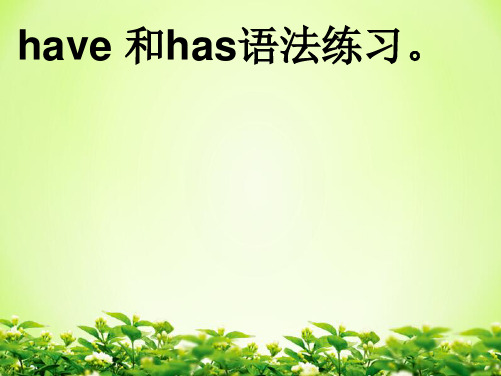
we you
have
they
2. have 用于第一人称单数(I, we),第二 人称(you)以及第三人称复数(they或其他 复数名词、并列的主语等)
have/has的句型转换: (1)否定句
主语+don't (doesn't)+have +…。
We don’t have books. 我们没有书。 Jane doesn’t have long hair. 简没有长发。
^ 2. Her father has two brothers. doesn’t have ^ 3. He has a computer. doesn’t have ^ 4. My cousin has a good friend. doesn’t have ^ 5. He has three pens. doesn’t have ^ 6. Tom has a kite. doesn’t have ^ 7. My teachers have nice pictures. don’t ^ 8. His father has a green car. doesn’t have ^ 9. Jim has a happy family. doesn’t have ^ ^ 10. Jenny has a wide mouth. doesn’t have
5. They have two bananas. Do
6. The girl has a big hat. Does……have
7. The woman has two babies. Does……have
8. 9.
KWaeteh’savmeoathneicr ehamsoadeplapirlaonf sDDsoeose.s……have
do-does的用法和练习题

do, does的用法●do用于当主语是第一人称I, 第二人称you 及复数时(复数包括we, they, these, those及两个以上的人或者事物。
●does 用于当主语是第三人称单数时(第三人称包括she, he, it, this, that,单独的事物或者人名等)。
含有实义动词的句型结构变换一、肯定陈述句1.当主语是I, you及复数时,谓语动词用原型。
Eg. I know it. (Eg.表示例如的意思)They have two volleyballs.Tina and Tom like ice cream.2. 当主语是第三人称单数时(第三人称包括she, he, it, this, that,单独的事物或者人名等)。
谓语动词要变为第三人称单数形式。
特别要注意have—hasEg. She has a set of keys.He knows my name.Tom needs a computer game.二、肯定陈述句变换成否定陈述句1.当主语是I, you及复数时,在谓语动词前加do not don’tEg. I don’t know it.They don’t have two volleyballs.Tina and Tom don’t like ice cream.2. 当主语是第三人称单数时,在谓语动词前加does not = doesn’t, 谓语动词打回原型Eg. She doesn’t have a set of keys.He doesn’t know my name.Tom doesn’t need a computer game.三、肯定陈述句变换成一般疑问句采用“一加二变三问号”。
一加:当主语是I, you及复数时,在句子开头加do;当主语是第三人称单数时(第三人称包括she, he, it, this, that,单独的事物或者人名等), 在句子开头加does;二变:变大小写;第一人称变为第二人称(I / we变为you, my / our变为 your);当主语是第三人称单数时,谓语动词要打回原型。
小学语法--have-has与-do-does-的用法-精讲精练

小学语法--h a v e-h a s 与-d o-d o e s-的用法-精讲精练-CAL-FENGHAI.-(YICAI)-Company One1小学英语do, does与have, has的用法精讲精练have , has 的用法巩固练习一、用have 和has填空1.I ____ a cat.2.He ____ a dog.3.She ____ long hair.4.We ____ a big house(房子).5.They ____ a happy family(家庭).6.It ____ a short tail(尾巴).7.You ____ a good teacher.8.Jane ____ two big eyes.9.Tom ____ a red pen.10.My mother ____ a beautiful nose.11. I______ a nice puppet.12. He ______a good friend.13. They ______some masks.14. We ________some flowers.15. She _________a duck.16. My father ________a new bike.17. Her mother _______a vase.18. Our teacher_______ an English book.19. Our teachers _______a basketball.20. Their parents(父母)______some books二、用have、has填空1. I ______ some red ink.2. His father ______ an old car.3. You ______ two big eyes.4. Their parents ______ many friends.5. My sister ______ a nice skirt.6. The teachers______ white clothes.7. He and she ______ some bananas.8. Look, the boy______ some apples.9. Our school ______ twelve classroom.10. The students ______ many books.11. Her sister______ a new bike.12. Their teacher ______ some nice pictures.13. Your mother______ a new bike.14. Li Ming mother ______ big eyes.15. Jenny and Danny ________two black pens.16. The dog _______some meat in its mouth.17. The students of Class One ________a football.18. Mary _________a doll.19. They _________some soup for supper.20. Our school ________a big library.do does 助动词用do•第一人称: I (我)、 we(我们)•第二人称: you(你)、 you(你们)•第三人称复数: they(他们)….用does•第三人称单数:he(他),she(她), it(它)….巩固练习填一填,读一读(用do 和does/don’t doesn’t填空)1. you like soccer2.Yes, I .3. they like ping--pong4.Yes, they .5. Tony and Ben like baseball6.No, they .7. your friend s like tennis8.Yes, they .9. your brother like basketball10.No, he .11. you like basketball12.Yes, I .13. they like watermelons14.No, they .15. Jenny have white bowls16.Yes, she .17. Peter have fork18.Yes, he .19. your father like apples20.Yes, he .21. your friend s like bananas22.No, they .23. your father and mother have spoons24.Yes, they .二、把下面的句子变成否定句。
hαve与has用法句型
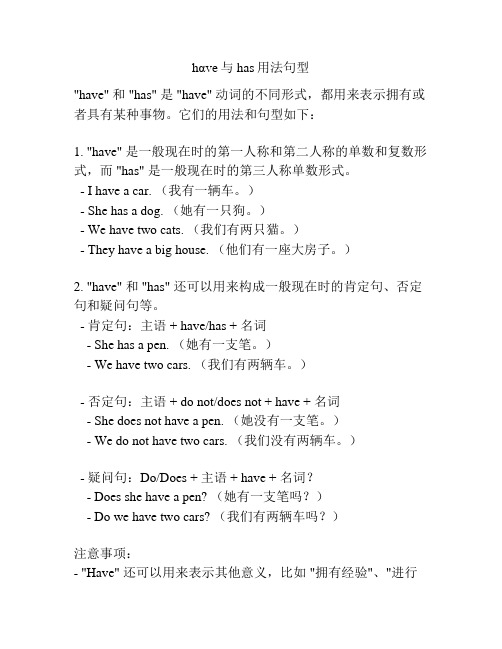
hαve与has用法句型"have" 和 "has" 是 "have" 动词的不同形式,都用来表示拥有或者具有某种事物。
它们的用法和句型如下:1. "have" 是一般现在时的第一人称和第二人称的单数和复数形式,而 "has" 是一般现在时的第三人称单数形式。
- I have a car. (我有一辆车。
)- She has a dog. (她有一只狗。
)- We have two cats. (我们有两只猫。
)- They have a big house. (他们有一座大房子。
)2. "have" 和 "has" 还可以用来构成一般现在时的肯定句、否定句和疑问句等。
- 肯定句:主语 + have/has + 名词- She has a pen. (她有一支笔。
)- We have two cars. (我们有两辆车。
)- 否定句:主语 + do not/does not + have + 名词- She does not have a pen. (她没有一支笔。
)- We do not have two cars. (我们没有两辆车。
)- 疑问句:Do/Does + 主语 + have + 名词?- Does she have a pen? (她有一支笔吗?)- Do we have two cars? (我们有两辆车吗?)注意事项:- "Have" 还可以用来表示其他意义,比如 "拥有经验"、"进行某个动作" 等。
感觉自己用的是 "have" 的其他意义时,要根据上下文来判断。
- "Has" 只用于第三人称单数(he, she, it),不用于其他人称的单数或者复数形式。
have-has和do-does专项练习
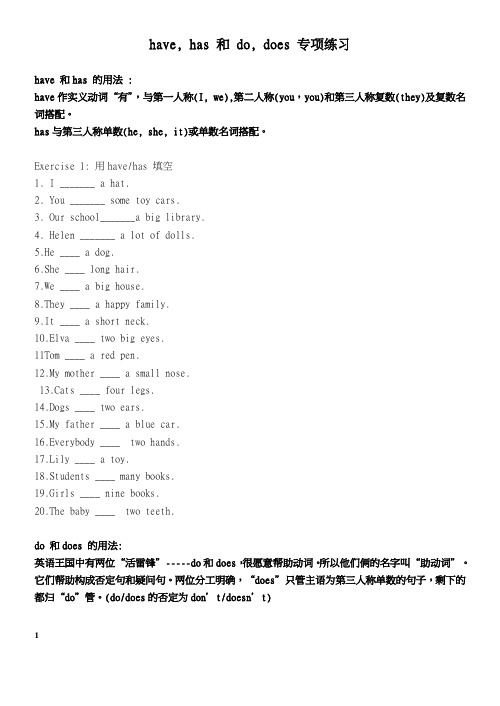
have, has 和 do, does 专项练习have 和has 的用法 :have作实义动词“有”,与第一人称(I, we),第二人称(you,you)和第三人称复数(they)及复数名词搭配。
has与第三人称单数(he, she, it)或单数名词搭配。
Exercise 1: 用have/has 填空1. I _______ a hat.2. You _______ some toy cars.3. Our school_______a big library.4. Helen _______ a lot of dolls.5.He ____ a dog.6.She ____ long hair.7.We ____ a big house.8.They ____ a happy family.9.It ____ a short neck.10.Elva ____ two big eyes.11Tom ____ a red pen.12.My mother ____ a small nose.13.Cats ____ four legs.14.Dogs ____ two ears.15.My father ____ a blue car.16.Everybody ____ two hands.17.Lily ____ a toy.18.Students ____ many books.19.Girls ____ nine books.20.The baby ____ two teeth.do 和does 的用法:英语王国中有两位“活雷锋”-----do和does,很愿意帮助动词。
所以他们俩的名字叫“助动词”。
它们帮助构成否定句和疑问句。
两位分工明确,“does”只管主语为第三人称单数的句子,剩下的都归“do”管。
(do/does的否定为don’t/doesn’t)1Exercise 1: 用 do/ does 填空1. [Do/Does]______ he watch TV at night? Yes he does.2. [Do/Does]______ you go to school everyday? No, I don’t.3. [Do/Does]______ Jack and Peter like apples?4. [Do/Does]______ Tina go swimming on Sunday?5. [Do/Does]______they play football? Yes, they ___[do/does]6. [Do/Does]______ we have a good teacher? Yes, we ____[do/does]7. [Do/Does]_____ they jump rope ? No, they ___[do not/does not].8. [Do/Does]_____your dog walk in the zoo?9. [Do/Does]____ I have a big nose? No, you _____[do not/does not]10. [Do/Does]____ your cats eat fish? Yes, they _____.[do/does].11. [Do/Does]_____ their mothers go shopping? No, they ____[do not/does not].12. I ___[do not/ does not] speak Japanese. [Do/Does] _____you speak Japanese? 2。
- 1、下载文档前请自行甄别文档内容的完整性,平台不提供额外的编辑、内容补充、找答案等附加服务。
- 2、"仅部分预览"的文档,不可在线预览部分如存在完整性等问题,可反馈申请退款(可完整预览的文档不适用该条件!)。
- 3、如文档侵犯您的权益,请联系客服反馈,我们会尽快为您处理(人工客服工作时间:9:00-18:30)。
have/has专项训练姓名________________ 分数________________have/has的用法①作“有”讲时,强调“所属关系”,表示“拥有”的意思。
其主语常为人或物。
如:My father has many new books.我爸爸有许多新书。
I have a new computer.我有一台新电脑。
②“have+表示一日三餐的名词”,意为“用餐”。
如:have breakfast/lunch/supper吃早饭/午饭/晚饭。
③“have+表示食品、饮料等名词”,意为“吃;喝”。
如:have bread吃面包 have eggs 吃鸡蛋 have tea 喝(一杯)茶。
④“have+表示动作的名词”,没有固定的意思,常与表示动作的名词同义。
如: have a rest 休息一下have a swim 游泳have a drink (of...)喝一点(……) have a look (at ...)(朝……)看一眼⑤“have+表示某种活动的名词”,意为“进行,举行”。
如:如:have a class (学生) 上课have a birthday party 举行生日聚会一.填写正确的形式。
1.I ____ (have) a cat.2.He ____ (have) a dog.3.She ____ (have) long hair.4.We ____ (have) a big house.5.They ____ (have) a happy family.6.It ____ (have) a short tail.7.You ____ (have) a good teacher.8.Elva ____ (have) two big eyes.9.Tom ____ (have) a red pen.10.My mother ____ (have) a beautiful nose.11.Cats ____ (have) four legs.12.Dogs ____ (have) two ears.13.My father ____ (have) a blue car.14.Everybody ____ (have) two hands.15.I ____ (have) a model plane.16.Lily ____ (have) a doll.17.Students ____ (have) many books.18.Girls ____ (have) many skirts.19.The baby ____ (have) no teeth.20.They ____ (have) some fish.二.Fill in the blank with “ have, has ”1. I_________ a nice puppet.2. He_________a good friend.3. They__________ some masks.4. We___________some flowers.5. She___________ a duck.6. My father____________ a new bike.7. Her mother___________a vase.8. Our teacher_________ an English book.9. Our teachers___________a basketball.10. Their parents___________some blankets11. Nancy_________many skirts.12. David__________some jackets.13. My friends__________a football.14. What do you__________?15. What does Mike__________?16. What do your friends___________?17. What does Helen___________?18. His brother________a basketball.19. Her sister_________a nice doll.20. Miss Li__________an English book.三.下面我们做一些练习来巩固一下:①根据汉语提示完成句子,使句意完整。
1. You ____ (有) two small eyes.2. My sister ____ (有) three pens.e here and ____ (吃) an apple.4.Mummy,can I ____ (要) a new bag.②下列句子均有一处错误,请圈出并改正。
1. I am have a green apple. 错:____ 改: ____2. Peter have a banana. 错:____ 改:____3. My brother and sister has a toy car. 错:____ 改:____4.They has got some roses. 错:____ 改:____四、选择题。
请将正确答案的序号填在()。
( )1.I big eyes. A. have B.has C.am( )2.They got five trains. A. have B.has C.am( )3.She got a big bedroom. A. have B.has C.is( )4.My toy dog big ears. A. are B.has C.is( )5. We dinner at seven o’clock. A. have B.has C.are( )6Tom and I got a football. A. have B.has C.are( )7.It got big leaves. A. have B.has C.is( )8.Can he lunch now? A. have B.has C.is关于have和has的练习其实也不是很难哦,不过上课的时候有的小朋友还是有些马虎哦,那么希望通过以下的练习能够加深印象!1.I ____ (have) a cat.2.He ____ (have) a dog.3.She ____ (have) long hair.4.We ____ (have) a big house.5.They ____ (have) a happy family.6.It ____ (have) a short tail.7.You ____ (have) a good teacher.8.Elva ____ (have) two big eyes.9.Tom ____ (have) a red pen.10.My mother ____ (have) a beautiful nose.11.Cats ____ (have) four legs.12.Dogs ____ (have) two ears.13.My father ____ (have) a blue car.14.Everybody ____ (have) two hands.15.I ____ (have) a model plane.16.Lily ____ (have) a doll.17.Students ____ (have) many books.18.Girls ____ (have) many skirts.19.The baby ____ (have) no teeth.20.They ____ (have) some fish.do/does专项训练姓名________________ 分数________________do/does的用法①作为行为动词,表示“做”如:I always do housework. 我经常做家务。
She usually does homework in the afternoon. 她通常在下午做作业。
②作为助动词,帮助主要动词构成否定和疑问。
(do/does的否定为don’t/doesn’t)如:We don’t like bananas.Do you like apples? Does he like English?He doesn’t like swimming.一.填写正确的否定形式(don’t/doesn’t)。
1.I ____ have a cat.2.He ____ like dogs..3.She ____ have a long hair.4.We ____ have a big house.5.They ____ have a happy family.6.It ____ have a short tail.7.You ____ like a good teacher.8.Elva ____ like a bad girl.9.Tom ____ have a red pen.10.My mother ____ have a beautiful nose.11.Cats ____ have two legs.12.Dogs ____ have one ears.13.My father ____ have a blue car.14.Everybody ____ have two hands.15.I ____like a model plane.16.Lily ____ like a toy.17.Students ____ have many books.18.Girls ____ have many skirts.19.The baby ____ have no tooth.20.They ____ have some fish.二.将下列句子变为否定句。
1. I want to go home now. ____________________________________2. She likes eating apples very much. ____________________________________3. He likes this coat. ____________________________________4. They have a lot of friends. ____________________________________5. We think chickens can swim. ____________________________________6. She wants to be a doctor. ____________________________________7. He has a dream. ____________________________________10. She thinks it can’t be ture.____________________________________三.将“二题中”的10个句子变为疑问句。
